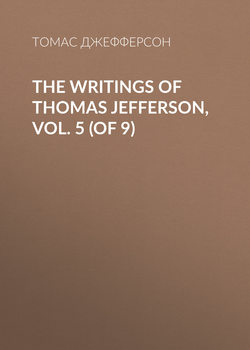Читать книгу The Writings of Thomas Jefferson, Vol. 5 (of 9) - Томас Джефферсон, Thomas Jefferson - Страница 61
TO MR. OLIVER EVANS
ОглавлениеMonticello, May 2, 1807.
Sir,—Your favor of the 18th came to hand two days ago. That the ingenuity of an advocate, seeking for something to defend his client, should have hazarded as an objection that it did not appear on the face of the patent itself, that you had complied with the requisitions of the act authorizing a patent for your invention, is not wonderful; but I do not expect that such an objection can seriously embarrass the good sense of a judge. The law requires, indeed, that certain acts shall be performed by the inventor to authorize a monopoly of his invention, and, to secure their being done, it has called in, and relied on, the agency of the Secretary of State, the Attorney General, and President. When they are satisfied the acts have been done, they are to execute a patent, granting to the inventor the monopoly. But the law does not require that the patent itself should bear the evidence that they should have been performed, any more than it requires that in a judgment should be stated all the evidence on which it is founded. The evidence of the acts on which the patent is founded, rests with those whose duty it is to see that they are performed; in fact, it is in the Secretary of State's office, where the interloper or inventor may have recourse to it if wanting. If these high officers have really failed to see that the acts were performed, or to preserve evidence of it, they have broken their trust to the public, and are responsible to the public; but their negligence cannot invalidate the inventor's right, who has been guilty of no fault. On the contrary, the patent, which is a record, has conveyed a right to him from the public, and that it was issued rightfully ought to be believed on the signature of these high officers affixed to the patent,—this being a solemn pledge on their part that the acts had been performed. Would their assertion of the fact, in the patent itself, pledge them more to the public? I do not think, then, that the disinterested judgment of a court can find difficulty in this objection. At any rate your right will be presumed valid, until they decide that it is not. Their final decision alone can authorize your resort to any remedial authority,—that is to say, to the Legislature, who alone can provide a remedy. Certainly an inventor ought to be allowed a right to the benefit of his invention for some certain time. It is equally certain it ought not to be perpetual; for to embarrass society with monopolies for every utensil existing, and in all the details of life, would be more injurious to them than had the supposed inventors never existed; because the natural understanding of its members would have suggested the same things or others as good. How long the term should be is the difficult question. Our Legislators have copied the English estimate of the term, perhaps without sufficiently considering how much longer, in a country so much more sparsely settled, it takes for an invention to become known, and used to an extent profitable to the inventor. Nobody wishes more than I do that ingenuity should receive a liberal encouragement: nobody estimates higher the utility which society has derived from that displayed by yourself; and I assure you with truth, that I shall always be ready to manifest it by every service I can render you. To this assurance I add that of my great respect and esteem, and my friendly salutations.
